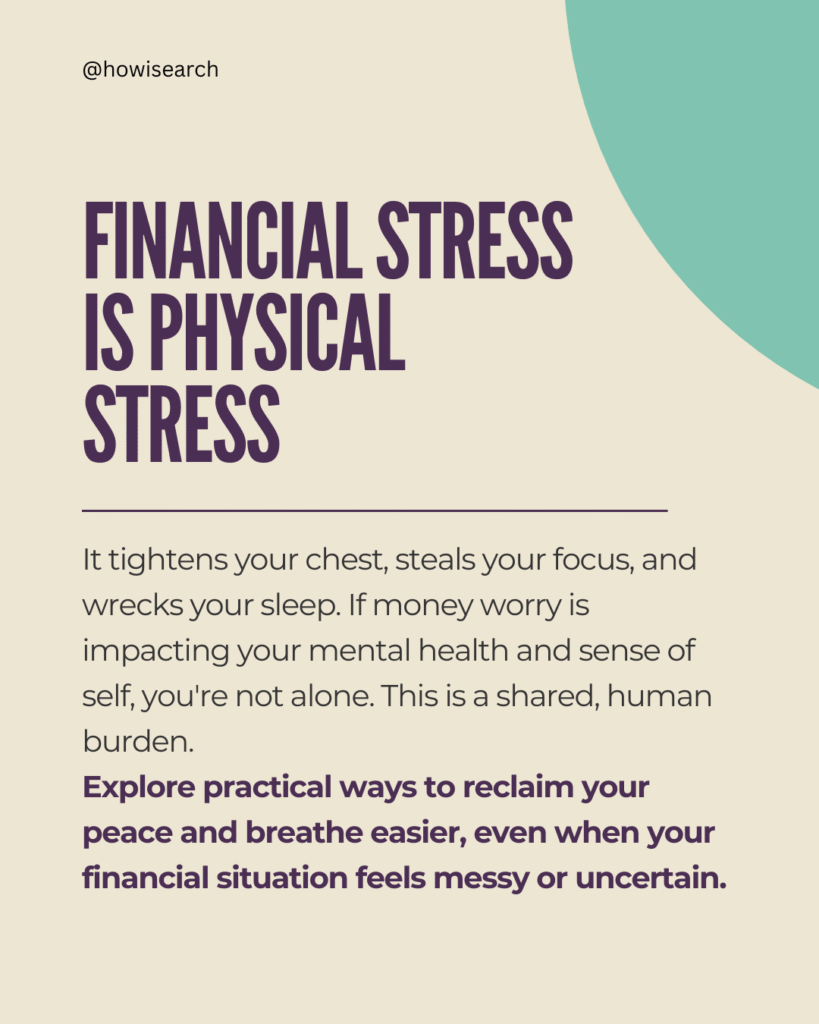Table of Contents
Financial Stress Affects All Aspects of Life
Financial stress impacts mental health. When money feels tight or uncertain, it affects everything from our mood and sleep to our sense of self. Concentration, decision-making, and even breathing become more difficult, and everything seems stretched like a tight rubber band. For many of us, financial worry extends beyond numbers and the bottom line, also affecting our sense of identity, security, and overall well-being.
If you’re feeling that weight, you’re not alone. The pressure around money is personal, structural, emotional, and deeply human. You’re part of a large community that understands what you’re going through. While this article won’t promise quick fixes, it will guide you through practical, grounded ways to reclaim a sense of peace, even when your financial situation feels messy or uncertain.

Why Financial Stress Hurts So Deeply
Money is never just about money. Stability, freedom, dignity, and choices are all dependent on our finances. When those feel at risk, it’s natural to experience anxiety, shame, or hopelessness. According to the American Psychological Association, approximately 70% of Americans report experiencing significant financial stress, particularly during periods of inflation, job insecurity, or major life transitions.
What we don’t discuss as much is the toll that stress takes on our nervous systems. The following symptoms have been linked to persistent financial strain:
- Sleep disturbances
- Increased anxiety and depression
- Headaches, fatigue, and irritability
- Difficulty focusing or making decisions
- (Source: Verywell Mind)
All that can create a feedback loop—where financial worry drains your mental clarity, and that exhaustion makes money management even harder.
Recognizing the Signs of Financial Stress
Here are common, often-overlooked signs that money stress may be affecting your well-being negatively:
- You avoid looking at your bank balance or unopened bills.
- You feel guilty when spending, even on essentials.
- You argue more often with loved ones.
- You withdraw socially due to shame or pressure.
- You ruminate late at night over “what if” scenarios.
The first step toward peace of mind is recognizing how the stress is showing up with an open mind. This recognition is not a sign of weakness, but a powerful step towards regaining control. You are merely responding like any human would under pressure.
Practical Ways to Regain Peace (Even Without a Windfall)
1. Simplify Your Next Financial Step
When everything feels overwhelming, take a step back. Instead of solving your entire financial picture in one night, ask: What’s one small, useful thing I can do today?
That might be:
- Checking your account balance
- Cancelling a subscription you forgot about
- Scheduling a conversation with someone you trust
Peace begins when you break down the task into something doable and then follow through.
2. Build Support Quietly and Honestly
You don’t have to figure everything out alone, nor must you have to broadcast your struggles, but consider opening up to:
- A financially grounded friend
- A free financial advisor or a nonprofit service
- A therapist or counselor who understands the emotional side of money
Even sharing aloud that you’re feeling stuck can relieve pressure.
For faith-based support, some people find peace in spiritual communities and related online resources.
3. Create Self-Care Routines for Mental Relief
While routines can’t fix your budget, they can stabilize your emotional state, and that matters because clear thinking comes more easily when you feel safer, even temporarily.
Try the following activities:
- Morning walks without your phone
- A 5-minute daily journaling habit
- Cooking one nourishing meal a day
- A recurring “finance check-in” window (set a timer, review your numbers, and then stop)
For structure, consider using mindfulness apps or guided meditations from reputable resources, such as Body & Mind Online.
4. Limit Financial News Exposure
Financial updates can help inform your decisions—but endless headlines about inflation, markets, and economic forecasts often add stress rather than resolve it. You don’t need to read every opinion or track every interest rate hike. Pick one trusted source. Check it on a schedule and then log off.
5. Reframe How You View Money
Many people inherit deep emotional scripts about money and what it says about their worth, security, or success. These rarely questioned stories can shape everything around you.
Ask yourself:
- Where did I learn my money beliefs?
- Whose expectations am I trying to meet?
- What does “enough” actually mean to me?
Even simply noticing these patterns can soften their grip. Try exercises like money meditations to explore this further.
6. Let Go of the Scarcity Story
More than just financial, scarcity is also psychological. When you’re in a stressful state, it’s easy to believe the future will always look like the present. But most financial situations change. And your value isn’t tied to your net worth. If you’ve made mistakes, acknowledge them, but don’t make them your whole story.
Try tracking:
- One thing you’re grateful for each day
- Small accomplishments (e.g., paying off a bill, asking for help, cooking instead of eating out)
Over time, these reminders can shift your mindset from panic to progress.
7. Set One Grounded, Achievable Goal
You don’t need a five-year financial plan. You need the next step.
Examples:
- Build a $250 emergency buffer
- Pay off one credit card
- Attend a free budgeting workshop
- Switch to a no-fee bank account
- Read one article from Investopedia
Peace comes from progress—not perfection.
8. Choose Meaning Over Measurement
Finally, it helps to remember that money is a means, not a measure of your life. After meeting basic needs, studies repeatedly show that happiness is more closely linked to purpose, relationships, and how we spend our time, rather than our income bracket or financial resources.
You can have peace while still figuring things out. You can volunteer, connect, and find joy, even while you’re still in debt.
Many people start their financial recovery once they stop tying their entire identity to economic performance.
You’re Not Alone in This
Financial peace doesn’t mean having everything sorted out and tied up neatly with a bow. Building internal strength, even while your external life feels like it’s collapsing, takes courage. The great thing is that there are many ways to find support and resources to help you on your path to financial health.
Recommended Book
If financial stress is keeping your mind in overdrive, Stop Overthinking by Nick Trenton offers practical tools to quiet mental noise and ease anxiety. With simple, science-backed techniques, this book can help you break out of analysis paralysis and find clarity—especially when it feels hardest to think clearly.
Get it on Amazon ->
(As an Amazon Associate, we may earn a small commission from qualifying purchases, at no extra cost to you.)








